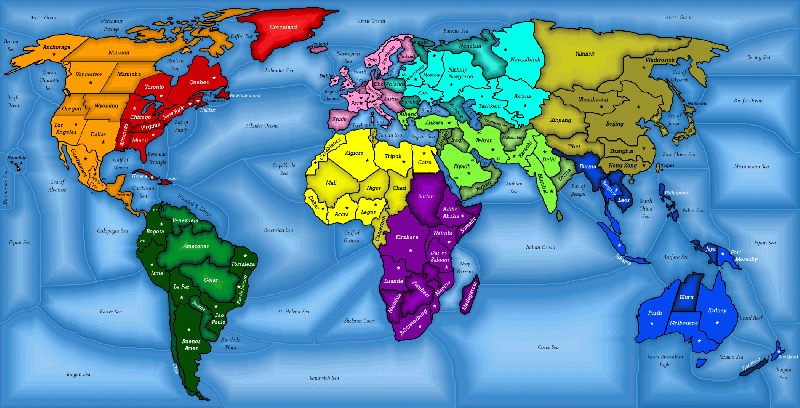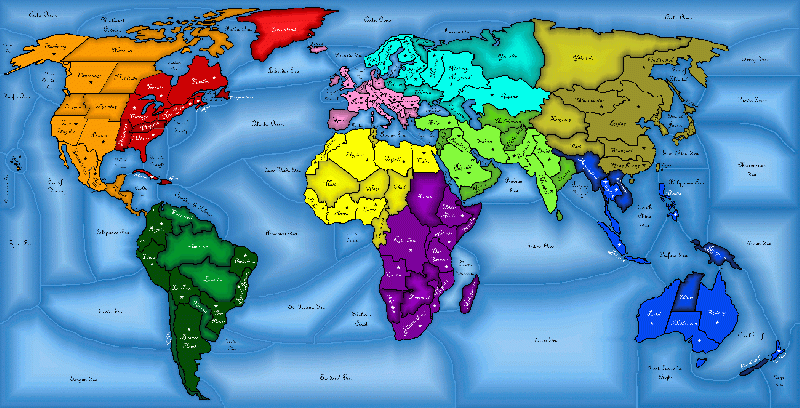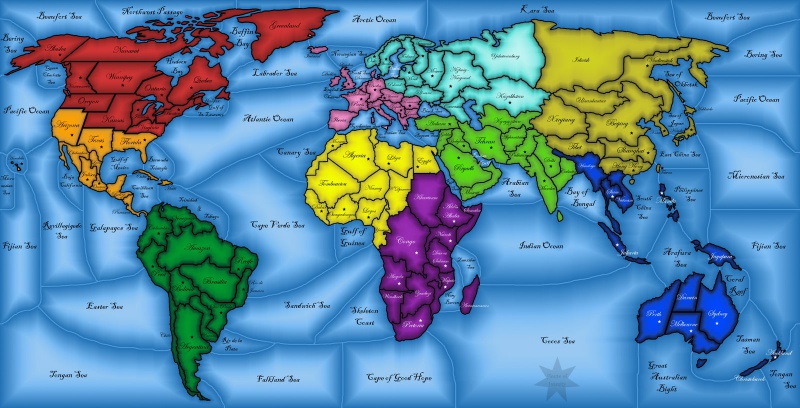Difference between revisions of "Worldwide"
(→Powers) |
|||
| (8 intermediate revisions by 2 users not shown) | |||
| Line 1: | Line 1: | ||
| − | [[Image: | + | Worldwide Diplomacy, version 1.2: |
| + | |||
| + | [[Image:Worldwide12.gif|800px]] | ||
==Rules== | ==Rules== | ||
| Line 6: | Line 8: | ||
1. The game starts in Winter 2000. Each player selects 5 of the 7 SC's in his color to be his home centers. Then each player builds 5 units of his choice. The two SC's not selected become neutral SC's. | 1. The game starts in Winter 2000. Each player selects 5 of the 7 SC's in his color to be his home centers. Then each player builds 5 units of his choice. The two SC's not selected become neutral SC's. | ||
| − | 2. 'S' denotes a strait. | + | 2. 'S' denotes a strait. Armies may cross straits without a convoy. In addition, if both centers on either side of a strait are occupied, a fleet wishing to go through the strait must have permission of one of the occupying units (A Ethiopia Permit F Red Sea - Arabian Sea). A unit is considered to occupy a center if it begins and ends its movement in that center. Permission does not constitute an order (so the same unit can support another unit). |
| + | |||
| + | 2a. Note that to move from the Caspian Sea to the Black Sea, a fleet must stop first in Armenia. | ||
| + | |||
| + | 3. When a player is eliminated his home centers may be taken over by the powers controlling those centers at that time, and only at that time. In order to take over an eliminated player's center(s), an equal number of building center(s) must be forfeited by the same player. | ||
| + | |||
| + | 4. Victory Condition: 29 sc's. | ||
==Powers== | ==Powers== | ||
| − | + | Quebec (red) | |
Mexico (orange) | Mexico (orange) | ||
| − | + | Amazon (dk green) | |
Europe (pink) | Europe (pink) | ||
Russia (grey) | Russia (grey) | ||
| − | + | Sahara (yellow) | |
| − | + | Congo (purple) | |
Persia (lt green) | Persia (lt green) | ||
China (gold) | China (gold) | ||
| Line 22: | Line 30: | ||
==Supply Centers== | ==Supply Centers== | ||
There are 70 SC's indicated by stars and flat colors on the map. | There are 70 SC's indicated by stars and flat colors on the map. | ||
| + | |||
| + | ==History== | ||
| + | Worldwide Diplomacy, version 1.1: | ||
| + | |||
| + | [[Image:Worldwide11.gif|800px]] | ||
| + | |||
| + | This version of the map left me with two things I wanted to address: first, Europe needed to be spread out a little more and second: Oceania needed to be more compact. What I've attempted to do with version 1.2 is put Europe in a little more powerful of a position by giving it more options of who to work with and direction to go. That meant shifting things around between Europe, Russia and Persia to try to keep the maritime balance that I've had all along. Meanwhile, attacking Oceania has always been a futile endeavor, because with so many spread out centres, it takes many units and lots of time with little reward. So, I consolidated his centres a bit to try to make it a more attractive target. | ||
| + | |||
| + | |||
| + | Worldwide Diplomacy, version 1.0: | ||
| + | |||
| + | [[Image:Worldwide.jpg|800px]] | ||
| + | |||
| + | After playing this version of the map two or three times, it was clear to me that there were two clear problems: 1 - Mexico needed a better starting situation and 2 - Russia was too hard to attack. Mexico's placement gave it one option: work with both NAm and SAm. If that didn't work out, it got attacked by both. So, I split North America east/west instead of north/south to make a triangle between the three powers to give them more options. I had also noticed that every game we had played on this map ended up with Russia coming out as a major force. It even happened in a game where both Europe and China attacked him and he had little help from anywhere else. So, I made the Arctic Ocean one space to give other powers more of a chance of attacking Russia. | ||
Latest revision as of 12:26, 21 October 2011
Worldwide Diplomacy, version 1.2:
Rules
Rules are the same as standard Diplomacy except:
1. The game starts in Winter 2000. Each player selects 5 of the 7 SC's in his color to be his home centers. Then each player builds 5 units of his choice. The two SC's not selected become neutral SC's.
2. 'S' denotes a strait. Armies may cross straits without a convoy. In addition, if both centers on either side of a strait are occupied, a fleet wishing to go through the strait must have permission of one of the occupying units (A Ethiopia Permit F Red Sea - Arabian Sea). A unit is considered to occupy a center if it begins and ends its movement in that center. Permission does not constitute an order (so the same unit can support another unit).
2a. Note that to move from the Caspian Sea to the Black Sea, a fleet must stop first in Armenia.
3. When a player is eliminated his home centers may be taken over by the powers controlling those centers at that time, and only at that time. In order to take over an eliminated player's center(s), an equal number of building center(s) must be forfeited by the same player.
4. Victory Condition: 29 sc's.
Powers
Quebec (red) Mexico (orange) Amazon (dk green) Europe (pink) Russia (grey) Sahara (yellow) Congo (purple) Persia (lt green) China (gold) Oceania (blue)
Supply Centers
There are 70 SC's indicated by stars and flat colors on the map.
History
Worldwide Diplomacy, version 1.1:
This version of the map left me with two things I wanted to address: first, Europe needed to be spread out a little more and second: Oceania needed to be more compact. What I've attempted to do with version 1.2 is put Europe in a little more powerful of a position by giving it more options of who to work with and direction to go. That meant shifting things around between Europe, Russia and Persia to try to keep the maritime balance that I've had all along. Meanwhile, attacking Oceania has always been a futile endeavor, because with so many spread out centres, it takes many units and lots of time with little reward. So, I consolidated his centres a bit to try to make it a more attractive target.
Worldwide Diplomacy, version 1.0:
After playing this version of the map two or three times, it was clear to me that there were two clear problems: 1 - Mexico needed a better starting situation and 2 - Russia was too hard to attack. Mexico's placement gave it one option: work with both NAm and SAm. If that didn't work out, it got attacked by both. So, I split North America east/west instead of north/south to make a triangle between the three powers to give them more options. I had also noticed that every game we had played on this map ended up with Russia coming out as a major force. It even happened in a game where both Europe and China attacked him and he had little help from anywhere else. So, I made the Arctic Ocean one space to give other powers more of a chance of attacking Russia.


